Did you know that the first voice ever heard on an all-sports radio station was a woman’s?
The date was July 1, 1987. WFAN in New York City was the radio station, and Suzyn Waldman was the first voice to be heard when she delivered a sports update at 3pm, right before giving way to Jim Lampley who hosted the first show on the station.
 At the time nobody knew whether or not the format or its personalities would last, but twenty eight years later, Waldman is still going strong. Not only has she covered all New York teams during her illustrious career, but she is now one half of the New York Yankees radio broadcast team opposite John Sterling.
At the time nobody knew whether or not the format or its personalities would last, but twenty eight years later, Waldman is still going strong. Not only has she covered all New York teams during her illustrious career, but she is now one half of the New York Yankees radio broadcast team opposite John Sterling.
If Suzyn could stand out, and make a difference in the number one market in the country, clearly it should be easier for other women who followed in her footsteps right?
Well it certainly seemed to be going that way, when the Fabulous Sports Babe (Nanci Donnellan) burst onto the Seattle scene in 1991, as a weekday talk show host on 950 KJR.
 The station’s programmer at the time was Rick Scott, and he believed that Donnellan brought something unique to the table, which was more important than her gender.
The station’s programmer at the time was Rick Scott, and he believed that Donnellan brought something unique to the table, which was more important than her gender.
“Nanci “got it” and knew how to push buttons and generate audience reaction” said Scott. “When I brought up the idea of having a woman do mid-days, they thought I was joking. We flew Nanci to Seattle, and went to lunch with the GM, and she had him laughing so hard he was crying. That helped the cause, but there were still plenty of challenges, especially during the first year.”
Donnellan would make a major impact during her three years at KJR, and her success was noticed by ESPN Radio who brought her to Bristol, CT to take on the challenge of doing a national show in 1994. She started with only 29 affiliates, but two years later, had built the show’s affiliate list to more than 170.
By 1997 though Donnellan was facing challenges from her bosses, some of them stemming from public criticisms she shared in a book titled “The Babe in Boyland“. “Every person on the planet seemed to complain about what I was doing and how I was doing it,” said Donnellan in her book. “But I stood my ground and told all the suits to please get out of my airstream.”
Eventually the marriage between ESPN and Donnellan would dissolve, and she’d move to the ABC Radio Networks in 1997. That move would be short lived, as ABC would part ways with her a little more than a year later.
 While her time at the top had come to an end, what was undeniable was her impact. Nanci Donnellan proved that women could not only share the stage with men in the sports talk radio space, but they could excel in it too.
While her time at the top had come to an end, what was undeniable was her impact. Nanci Donnellan proved that women could not only share the stage with men in the sports talk radio space, but they could excel in it too.
So that should’ve opened up doors for so many more women to have success in the format right?
Not exactly.
Today, sports radio stations are measured by their ability to connect with Men 25-54. If a station delivers in that demographic, all is right in the world. But what does that say about people who are younger or older than the desired demo? Does their listening not matter?
Furthermore, what does it say about women? Are we naive to think that females don’t also enjoy sports, listening to sports radio and talking about it with their friends? Do their dollars not matter to a station’s advertisers?
 Go to a sporting event today, and the stands are not 80-90% full of men. Yet sports talk radio listening according to the Nielsen ratings is fueled by heavy male listening. If those numbers are accurate, it puts programmers and radio companies in a tough spot. The goal is to deliver content which satisfies the listening audience, and produces high ratings, and larger revenues. If 4 out of every 5 listeners are men, and they respond favorably to male voices and the way men discuss sports, then it becomes much harder for women to earn a break!
Go to a sporting event today, and the stands are not 80-90% full of men. Yet sports talk radio listening according to the Nielsen ratings is fueled by heavy male listening. If those numbers are accurate, it puts programmers and radio companies in a tough spot. The goal is to deliver content which satisfies the listening audience, and produces high ratings, and larger revenues. If 4 out of every 5 listeners are men, and they respond favorably to male voices and the way men discuss sports, then it becomes much harder for women to earn a break!
Amanda Gifford who is a Program Director for the ESPN Radio Network shared her views on the situation: “The demographics of the format have a lot to do with how many women come on as hosts. It’s still completely dominated by men – 85 or 90% of audiences are male. As we see some of the “pioneers” for women who have strong opinions in the media continue to flourish – like Michelle Beadle, Jemele Hill, Sarah Spain, Kate Fagan, etc. – they will help blaze the trail of opportunities for girls/young women interested in this type of career path.”
Ratings numbers aside, there are other reasons as well contributing to the lack of females working as sports radio hosts. First, not as many women pursue a path in the radio industry. If a woman can watch other women cover sports on her television, but can’t hear a female talk about it on the radio, it’s likely to influence her decision of which medium to pursue. The better financial opportunities in television also factor in.
The other part of the issue revolves around programming philosophies and radio ratings measurement. While I know a ton of great programmers around the country who take risks and make smart, and inspiring decisions, there are still many who are creatures of habit, and unlikely to change, especially if the formula is working.
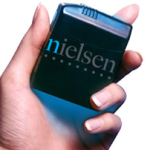 As it pertains to ratings, the data provided to radio stations is often very inconsistent. PPM meters which are used to measure local listening and audience characteristics, have been proven to have major flaws, and the sampling sizes in many local markets are tiny. That puts radio operators and talent in a difficult spot, because they can’t draw a firm conclusion, on whether or not the programming they’re providing is working.
As it pertains to ratings, the data provided to radio stations is often very inconsistent. PPM meters which are used to measure local listening and audience characteristics, have been proven to have major flaws, and the sampling sizes in many local markets are tiny. That puts radio operators and talent in a difficult spot, because they can’t draw a firm conclusion, on whether or not the programming they’re providing is working.
While I want to trust the data that says 80-90% of listening to sports stations is done by males, I’ve seen too many inaccuracies to treat it as fact. I do believe men have larger interest in listening to the format than women, but whether it’s 65&%, 75% or 85% is debatable. Even then, that’s where the numbers stand right now. They won’t grow, and become even more attractive to advertisers if the same strategy and execution continues.
When you look at the world today, women are making an impact and effecting change in all areas of society. There’s no better example than in the political arena, where women now run and receive serious consideration for President of the United States of America.
If a woman can run for the most high profile office in the nation, and gain the trust of males in leading our country, then she should be able to find a place inside of a sports radio station’s lineup right? It may seem like a no-brainer but it’s still an issue in sports radio.
 During the mid to late 2000’s, Jennifer “The Little Ball of Hate” Engel hosted a radio program for ESPN 103.3 in Dallas. She started with the station as a contributor before earning a spot as a full-time weekday host. The belief was that she’d break through and disrupt the marketplace. Unfortunately, the audience wasn’t ready for the change, and although she was skilled, the show underperformed.
During the mid to late 2000’s, Jennifer “The Little Ball of Hate” Engel hosted a radio program for ESPN 103.3 in Dallas. She started with the station as a contributor before earning a spot as a full-time weekday host. The belief was that she’d break through and disrupt the marketplace. Unfortunately, the audience wasn’t ready for the change, and although she was skilled, the show underperformed.
I spoke with a former Dallas personality about the situation: “Jen was one of the guys, and she had strong, accurate and well thought out opinions and was respected by listeners and other members of the media. However, when the radio station opted to make her the center of her own show, perceptions changed. There was a a lot of feedback from listeners about not wanting to hear “my wife” complain or lecture listeners about sports. That information was learned through professional panels and companies hired to do local market research. The station tried different marketing concepts, and supported her, but to no avail. In the end the show had to be cancelled due to poor ratings, and the market’s unwillingness to embrace a female led sports talk show“.
What I found surprising is that when I asked this same person if they still felt a woman could succeed in the format as a weekday talk show host, they remained supportive: “No question it can work. The Dallas situation hasn’t altered my belief that our format is ready for more female hosts to prosper. Having said that, it still has to be the right woman. Women in the format have to build more credibility than their male counterparts, and can make fewer mistakes. They must also be more thick skinned and determined than men. Let’s also not be naive, it depends greatly market to market. Some markets simply aren’t open minded enough to get it.”
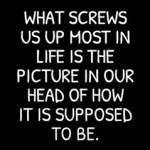 Let’s be honest, most people who run companies, prefer the safer path. The unknown is scary, especially in today’s world where instant success is necessary, or it could cost you your job. But with great risk comes great reward. However, most groups are less likely to endure criticisms, questions, and backlash from local market listeners, advertisers, and other media partners, and risk their bottom line, for an out of the box hiring decision.
Let’s be honest, most people who run companies, prefer the safer path. The unknown is scary, especially in today’s world where instant success is necessary, or it could cost you your job. But with great risk comes great reward. However, most groups are less likely to endure criticisms, questions, and backlash from local market listeners, advertisers, and other media partners, and risk their bottom line, for an out of the box hiring decision.
They say it usually takes 18-24 months to judge a show and whether or not it will work in a local market. I’m not sure that same courtesy applies for a local show led by a female talent, and that’s unfair. It’s also a big reason why it’s so important for those who do get an opportunity to make it count.
Kate Scott who works for KNBR 680 in San Francisco, notes that when it comes to perceptions in the industry, there definitely are double standards: “Externally, there’s no doubt we’re treated differently. If I mispronounce a player’s name I’m a no-nothing idiot who only got hired because the station was looking for some diversity. If a male colleague does the same thing, aww shucks, he was out late the night before or ha, there goes so-and-so again, he sucks at those tough names.”
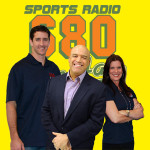 But should there be different rules for men and women in sports radio? Sandra Golden of 680 The Fan in Atlanta makes an interesting point: “There are 12 people working at my station as full time hosts. NONE of the dozen are treated the same. We aren’t measured the same, and nor should we be. We all have different resumes, are paid differently, and some are more popular than others. I might add, that’s just like any other office in Pick-a-Town, USA.”
But should there be different rules for men and women in sports radio? Sandra Golden of 680 The Fan in Atlanta makes an interesting point: “There are 12 people working at my station as full time hosts. NONE of the dozen are treated the same. We aren’t measured the same, and nor should we be. We all have different resumes, are paid differently, and some are more popular than others. I might add, that’s just like any other office in Pick-a-Town, USA.”
While sports radio may indeed be a fun industry to work in, it is still a business, and it’s not one built on satisfying quotas, or personal agendas. The focus is on employing dynamic, compelling, and highly entertaining personalities who possess the ability to provide thought provoking content and develop a connection with a local audience, most of which is made up of white males between the ages of 25 and 54.
Any talent who hosts a sports radio program must be able to connect with advertisers, and sell their products to the audience, and of course, generate ratings in the Men 25-54 demographic. Until the rules change, that’s what station’s require to command larger dollars.
The one area though that deserves larger discussion, is why aren’t women a bigger part of the solution? We often assume that a female on the air talking about sports, doesn’t have the same ability as a male to keep a male audience listening, but we don’t seem to have any objections when a female personality talks about rock music, sex or movies. Those issues can be largely targeted to Men too.
And what about politics? If you turn on Fox News, MSNBC, or CNN, you’ll find plenty of talented women talking about key issues, and they don’t seem to have trouble keeping male viewers watching. And those men don’t watch just because the female host looks good either. Oprah Winfrey, Barbara Walters and Katie Couric proved you don’t have to be a supermodel to be an excellent broadcaster, and connect with an audience.
 So if women can be accepted talking about music, lifestyle, sex, politics, and every other part of our daily conversations, then why is it so difficult for them to earn a heavier presence in the sports radio industry? And I’m not just talking about the Sports Update Anchor, Traffic Reporter, or Morning Show Sidekick role either. I’m talking about being the face of a talk show and radio station, much like the Fabulous Sports Babe was in the 1990’s for KJR and ESPN Radio.
So if women can be accepted talking about music, lifestyle, sex, politics, and every other part of our daily conversations, then why is it so difficult for them to earn a heavier presence in the sports radio industry? And I’m not just talking about the Sports Update Anchor, Traffic Reporter, or Morning Show Sidekick role either. I’m talking about being the face of a talk show and radio station, much like the Fabulous Sports Babe was in the 1990’s for KJR and ESPN Radio.
Maybe I’m wrong but I think Michelle Beadle and Katie Nolan have the talent to deliver a highly entertaining talk show. I also think Rachel Nichols pulls information out of guests equally or better than many male broadcasters. I also scan the country and see numerous women in local markets building strong personal brands and proving they can connect and win. Yes there are many females who aren’t ready for the spotlight, but the same can be said about some men.
As I did my research for this piece, I uncovered some things that may make a few people uncomfortable. I looked at the makeup of the 5 national sports radio networks (ESPN, Fox, CBS, NBC, Yahoo), who broadcast nationwide, and target their content to Men 25-54 audiences. In reviewing the Monday-Friday lineups of all 5 networks, I found only 1 woman, featured as a Monday-Friday talk show host. That female was Amy Lawrence, who’s hosting currently for the CBS Sports Radio Network.
 Let this sink in for a second, between 5 national networks, there are 34 white males holding positions as Monday-Friday talk show hosts. Only 10 personalities who were female or non-white, held spots as Monday-Friday talk show hosts. That means nearly 71% of on-air personalities delivering weekday national talk shows are white males. If you look across the country on local sports stations, those percentages are even higher.
Let this sink in for a second, between 5 national networks, there are 34 white males holding positions as Monday-Friday talk show hosts. Only 10 personalities who were female or non-white, held spots as Monday-Friday talk show hosts. That means nearly 71% of on-air personalities delivering weekday national talk shows are white males. If you look across the country on local sports stations, those percentages are even higher.
While I believe in people earning opportunities based on talent, and fit, not on their race or gender, there’s also something to be said for employing broadcasters from different backgrounds, because the audiences who we serve are diverse, and deserve to hear differing viewpoints.
I reached out to some of the best women in the sports radio industry to get their views on the challenges they face, the way they’re measured, and what needs to happen for the format to evolve and include more females. I think that as you read their answers, you’ll gain a stronger perspective, and deeper appreciation for what they provide, how they think, and what they’ve experienced, while trying to effect change in the sports talk format.
Special Guests:
- Sarah Spain-ESPN Radio Network and ESPN 1000 in Chicago
- Gianna Franco-95.7 The Game in San Francisco
- Joy Taylor-104.3 and 790 The Ticket in Miami
- Kate Scott-KNBR 680 in San Francisco
- Anita Marks-98.7 ESPN NY
- Michelle Smallmon-ESPN Radio
- Jessamyn McIntyre-710 ESPN in Seattle
- Amy Lawrence-CBS Sports Radio Network
- Amanda Gifford-ESPN Radio Senior Director of Daytime Programming
Why do you believe more women are taking larger interest in sports radio?
 Spain: It’s hard for women to dream of doing a job they don’t see other women doing. For so long certain jobs were almost off limits to women, so wanting to go after them seemed unrealistic. The more women are given a chance, the more women will want a chance. And that isn’t just the result of talented women pushing for jobs but also the decision makers and front office folks being forward-thinking and open-minded. As for listeners, as society becomes less rigid about gender roles, women are free to like whatever they like. Title IX was also huge. Women are now free to participate in sports, and women who play sports as kids grow up to be sports fans.
Spain: It’s hard for women to dream of doing a job they don’t see other women doing. For so long certain jobs were almost off limits to women, so wanting to go after them seemed unrealistic. The more women are given a chance, the more women will want a chance. And that isn’t just the result of talented women pushing for jobs but also the decision makers and front office folks being forward-thinking and open-minded. As for listeners, as society becomes less rigid about gender roles, women are free to like whatever they like. Title IX was also huge. Women are now free to participate in sports, and women who play sports as kids grow up to be sports fans.
 Lawrence: Women with an interest in working in sports radio are definitely emboldened by the success of those who’ve gone before. Now and then, I hear from women in local radio markets who tell me I’m their role model and they want to get to where I am in the business. A door that was previously locked tight has been kicked open, and that encourages other women to try their hand at radio. At the same time, sports radio is still dominated by men far more than TV. Popularity in radio has nothing to with what you look like and how attractive you are. It’s not as “glamorous” nor does it pay as well across the board. Listeners are extremely tough on their hosts, even tougher on women, so while you SEE more and more women in lead roles on sports television, it’s still relatively uncommon in radio.
Lawrence: Women with an interest in working in sports radio are definitely emboldened by the success of those who’ve gone before. Now and then, I hear from women in local radio markets who tell me I’m their role model and they want to get to where I am in the business. A door that was previously locked tight has been kicked open, and that encourages other women to try their hand at radio. At the same time, sports radio is still dominated by men far more than TV. Popularity in radio has nothing to with what you look like and how attractive you are. It’s not as “glamorous” nor does it pay as well across the board. Listeners are extremely tough on their hosts, even tougher on women, so while you SEE more and more women in lead roles on sports television, it’s still relatively uncommon in radio.
 Scott: I think a lot of things factor into it. Title IX is the foundation. My generation – as opposed to those before us – grew up being told “yes you can”, which we applied to more than just playing sports. I also think that’s tied into the growth in female listenership. More women had the opportunity to play and fall in love with sports as a result of the law, and thus, you’ve got a larger number of women in the radio demos that now want to keep in touch with their teams.
Scott: I think a lot of things factor into it. Title IX is the foundation. My generation – as opposed to those before us – grew up being told “yes you can”, which we applied to more than just playing sports. I also think that’s tied into the growth in female listenership. More women had the opportunity to play and fall in love with sports as a result of the law, and thus, you’ve got a larger number of women in the radio demos that now want to keep in touch with their teams.
 McIntyre: I think that women are finding more opportunities in places other than TV and the sidelines. The industry is changing, as are attitudes about women in the industry. I think it’s indicative of the change we’re seeing in society, rather than just in sports media. More young girls are studying sports communications, and entering male-dominated industries. I’d like to think it’s a sign of the times, where there is more equality across the board in many areas both in and out of the sports communications world.
McIntyre: I think that women are finding more opportunities in places other than TV and the sidelines. The industry is changing, as are attitudes about women in the industry. I think it’s indicative of the change we’re seeing in society, rather than just in sports media. More young girls are studying sports communications, and entering male-dominated industries. I’d like to think it’s a sign of the times, where there is more equality across the board in many areas both in and out of the sports communications world.
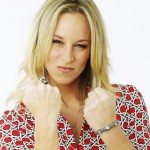 Marks: I believe it’s simply a case of more opportunities presenting themselves. The biggest change is that General Manager’s and Program Director’s are feeling there is stronger value in having a female voice on their station or network, and providing the platform.
Marks: I believe it’s simply a case of more opportunities presenting themselves. The biggest change is that General Manager’s and Program Director’s are feeling there is stronger value in having a female voice on their station or network, and providing the platform.
How do you convince a predominantly male 25-54 audience to keep an open mind towards you and judge you by your content rather than your gender?
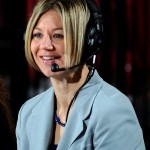 Lawrence: I make it a priority to know what I’m talking about, inside and out. I understand a good chunk of the target audience will start listening to me with a bias, whether overt or subconscious. But when I know my material cold, when I’ve watched the same games, when I can answer their questions and back up my strong opinions, many of them will eventually come to respect me. Humor helps, too. Listeners want to relate to their radio hosts. They want to know you’re like them, so while my sports revolve around the top sports stories and topics, I’m not afraid to dive into music, superheroes, lawnmowers, travel, or food in small doses. The last and most important quality as a female host is confidence. No one is going to agree with me 100% of the time, and I welcome dissenting opinions. I’ll debate with anyone as long as it’s done semi-respectfully. When challenged, the worst thing I can do is back down or become wishy-washy. If you do that you’ll get eaten alive.
Lawrence: I make it a priority to know what I’m talking about, inside and out. I understand a good chunk of the target audience will start listening to me with a bias, whether overt or subconscious. But when I know my material cold, when I’ve watched the same games, when I can answer their questions and back up my strong opinions, many of them will eventually come to respect me. Humor helps, too. Listeners want to relate to their radio hosts. They want to know you’re like them, so while my sports revolve around the top sports stories and topics, I’m not afraid to dive into music, superheroes, lawnmowers, travel, or food in small doses. The last and most important quality as a female host is confidence. No one is going to agree with me 100% of the time, and I welcome dissenting opinions. I’ll debate with anyone as long as it’s done semi-respectfully. When challenged, the worst thing I can do is back down or become wishy-washy. If you do that you’ll get eaten alive.
 Taylor: Being authentic is the best way to win the male sports fan over. I think I’ve been accepted because I’m not trying to constantly prove I should be there. I’m there because I worked hard, took the same path my peers took and paid my dues. I grew up in a sports city, Pittsburgh, in a sport family, and played sports my whole life. Then I went to school, started as an intern, worked a few part-time jobs, and worked my way to on-air as a producer for several years. All of those experiences have helped me earn the audience’s trust and respect.
Taylor: Being authentic is the best way to win the male sports fan over. I think I’ve been accepted because I’m not trying to constantly prove I should be there. I’m there because I worked hard, took the same path my peers took and paid my dues. I grew up in a sports city, Pittsburgh, in a sport family, and played sports my whole life. Then I went to school, started as an intern, worked a few part-time jobs, and worked my way to on-air as a producer for several years. All of those experiences have helped me earn the audience’s trust and respect.
 Gifford: Just be you. Talk sports. Have a personality. Have fun. Have an opinion. Make me think. Don’t wave the “I’m a female flag.” It doesn’t matter what gender you are as long as the content is compelling. Also, don’t take things personally and stay far away from your social media mentions – there are a lot of not nice people out there!
Gifford: Just be you. Talk sports. Have a personality. Have fun. Have an opinion. Make me think. Don’t wave the “I’m a female flag.” It doesn’t matter what gender you are as long as the content is compelling. Also, don’t take things personally and stay far away from your social media mentions – there are a lot of not nice people out there!
 Franco: I don’t pretend to be a stat expert or sport’s almanac. I’m a fan, like the listeners, and I focus on staying knowledgeable, offering a smart opinion and staying authentic. The second you try to pretend to be something you’re not, it comes across on the air. I also try to keep in mind who my audience is. I grew up with a dad and brother who are diehard sports fans, so I have insight into that perspective, and always ask myself would this content matter to them? I also don’t lose sight of the fact that I am a voice for the local female listeners as well.
Franco: I don’t pretend to be a stat expert or sport’s almanac. I’m a fan, like the listeners, and I focus on staying knowledgeable, offering a smart opinion and staying authentic. The second you try to pretend to be something you’re not, it comes across on the air. I also try to keep in mind who my audience is. I grew up with a dad and brother who are diehard sports fans, so I have insight into that perspective, and always ask myself would this content matter to them? I also don’t lose sight of the fact that I am a voice for the local female listeners as well.
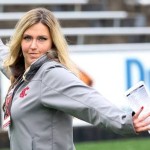 McIntyre: You’ve got to be tough and grow thick skin. Getting defensive never helps. The best advice I got was from Dan Patrick. He told me I had the ability to make it in this business, but to ‘not be just another cute chick‘. He explained that you can get away with a lot as ‘a cute chick‘ and probably actually maintain a job, but you’ll never truly succeed to your potential. I’ve taken that with me for almost ten years now and am grateful he took the time to point that out to me. I’ve always considered myself a hard worker, but it gave me perspective I could truly appreciate.
McIntyre: You’ve got to be tough and grow thick skin. Getting defensive never helps. The best advice I got was from Dan Patrick. He told me I had the ability to make it in this business, but to ‘not be just another cute chick‘. He explained that you can get away with a lot as ‘a cute chick‘ and probably actually maintain a job, but you’ll never truly succeed to your potential. I’ve taken that with me for almost ten years now and am grateful he took the time to point that out to me. I’ve always considered myself a hard worker, but it gave me perspective I could truly appreciate.
Do you believe women and men who perform in the sports radio format are treated the same and measured by the same rules internally & externally?
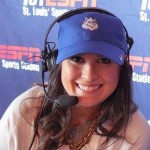 Smallmon: Unfortunately, no. There have been times when I was overlooked for positions that were given to males who were less qualified than me. I’ve gotten the ‘you never played the game, you can’t understand football’ attitude, when a man who never played football probably wouldn’t face similar questions about participating in an NFL broadcast. Also, any time there was a photo posted of me on our station’s website, there would be comments about my appearance. Radio is auditory and not visual, yet the main thing many people cared about was my physical appearance. That’s something men are lucky they don’t have to deal with as often. The double standard will probably be there for a long time, but I hope we continue to chip away at it until it’s gone.
Smallmon: Unfortunately, no. There have been times when I was overlooked for positions that were given to males who were less qualified than me. I’ve gotten the ‘you never played the game, you can’t understand football’ attitude, when a man who never played football probably wouldn’t face similar questions about participating in an NFL broadcast. Also, any time there was a photo posted of me on our station’s website, there would be comments about my appearance. Radio is auditory and not visual, yet the main thing many people cared about was my physical appearance. That’s something men are lucky they don’t have to deal with as often. The double standard will probably be there for a long time, but I hope we continue to chip away at it until it’s gone.
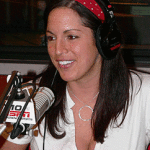 Spain: The decision makers at newspapers, radio and TV studios and websites are still predominately white men hiring other white men. They need to understand the benefits of diversity, and bringing in different voices and backgrounds in order for new people to be given a shot. A change in the mindset of those folks, an increase in the number of women seeking jobs in the industry, and the continued hard work of the women who have made it will all combine to help change the climate. And, again, the longer people see women in jobs the less shocking or noteworthy it will become.
Spain: The decision makers at newspapers, radio and TV studios and websites are still predominately white men hiring other white men. They need to understand the benefits of diversity, and bringing in different voices and backgrounds in order for new people to be given a shot. A change in the mindset of those folks, an increase in the number of women seeking jobs in the industry, and the continued hard work of the women who have made it will all combine to help change the climate. And, again, the longer people see women in jobs the less shocking or noteworthy it will become.
 Franco: No, not really. I think all stations want a variety. It’s attractive to listeners, and offers a different perspective, but that also means you have to work that much harder for respect and job advancement. It’s very easy for some male hosts to not take you seriously, and use you for only fun or frilly topics, so I learned to not be afraid to speak, crack the mic, and be aggressive. You have to do that if you want to be seen as more than just the token girl on the sports station.
Franco: No, not really. I think all stations want a variety. It’s attractive to listeners, and offers a different perspective, but that also means you have to work that much harder for respect and job advancement. It’s very easy for some male hosts to not take you seriously, and use you for only fun or frilly topics, so I learned to not be afraid to speak, crack the mic, and be aggressive. You have to do that if you want to be seen as more than just the token girl on the sports station.
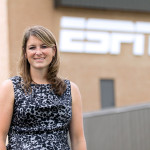 Gifford: Unfortunately I think we have a little ways to go here. Because sports talk radio is mostly dominated by males, it still is a little surprising to the audience when they hear a female voice. I think similar to the way people react to female play-by-play announcers during men’s games (like Beth Mowins or Pam Ward, for example, who have called CFB games for ESPN, or Doris Burke in the NBA as a color analyst), there is not the same benefit of the doubt that male hosts are given. I think women have to work harder to make sure they don’t lose credibility with the audience even if they only make one mistake. It’s not fair, but it’s reality.
Gifford: Unfortunately I think we have a little ways to go here. Because sports talk radio is mostly dominated by males, it still is a little surprising to the audience when they hear a female voice. I think similar to the way people react to female play-by-play announcers during men’s games (like Beth Mowins or Pam Ward, for example, who have called CFB games for ESPN, or Doris Burke in the NBA as a color analyst), there is not the same benefit of the doubt that male hosts are given. I think women have to work harder to make sure they don’t lose credibility with the audience even if they only make one mistake. It’s not fair, but it’s reality.
 Taylor: No, I do not. Just because the industry is changing does not mean it’s an equal playing field. Women have to be better, funnier, smarter, more professional, etc. Fans want to know you’re legit, rather than just accepting that you’re the new host on their favorite station. Overall, my experience has been great, but there are always moments when I know there is still work to be done.
Taylor: No, I do not. Just because the industry is changing does not mean it’s an equal playing field. Women have to be better, funnier, smarter, more professional, etc. Fans want to know you’re legit, rather than just accepting that you’re the new host on their favorite station. Overall, my experience has been great, but there are always moments when I know there is still work to be done.
Despite the growth, why do you believe women are still largely under-represented in the format? What needs to change for the growth to become even larger?
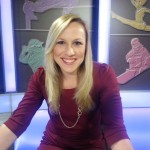 Scott: Women are under-represented in our industry for the same reason they’re underrepresented in a variety of industries. Growing up, we didn’t see anyone that looked like us working those jobs, so we just didn’t think they were an option. Thankfully, I had family, friends, mentors, and school advisors who told me otherwise, which – in my opinion – is where things need to start. I also think it’s important for those of us in the industry to realize the impact we can have on the future. Every time a little girl comes up to say hello at a remote broadcast, I ask her when she’s going to take my job. I think it’s our responsibility to plant that seed or, if it’s already been planted, reaffirm the fact that we believe that they can do it. Case in point, ESPN’s Linda Cohn (who also started in radio) was my favorite SportsCenter anchor growing up. I wrote her a snail mail letter my freshman year in college and about eight months later, got a short, email response from her thanking me for my support and encouraging me to intern to get into the industry. I printed that puppy out, framed it, and had it on my wall all thru college, and I’ve been working my tail off to get to work with her ever since. It’s up to us to be that person for the next generation. Hopefully, with so many more women in sports radio these days, that will lead to even MORE women working in sports radio down the road.
Scott: Women are under-represented in our industry for the same reason they’re underrepresented in a variety of industries. Growing up, we didn’t see anyone that looked like us working those jobs, so we just didn’t think they were an option. Thankfully, I had family, friends, mentors, and school advisors who told me otherwise, which – in my opinion – is where things need to start. I also think it’s important for those of us in the industry to realize the impact we can have on the future. Every time a little girl comes up to say hello at a remote broadcast, I ask her when she’s going to take my job. I think it’s our responsibility to plant that seed or, if it’s already been planted, reaffirm the fact that we believe that they can do it. Case in point, ESPN’s Linda Cohn (who also started in radio) was my favorite SportsCenter anchor growing up. I wrote her a snail mail letter my freshman year in college and about eight months later, got a short, email response from her thanking me for my support and encouraging me to intern to get into the industry. I printed that puppy out, framed it, and had it on my wall all thru college, and I’ve been working my tail off to get to work with her ever since. It’s up to us to be that person for the next generation. Hopefully, with so many more women in sports radio these days, that will lead to even MORE women working in sports radio down the road.
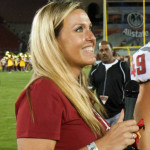 McIntyre: There’s always going to be some level of divide, based on the fact that more men play the sports we talk about than women. While we want to cater more and more to a greater audience, the bottom line is that, more men are interested in football/baseball/etc. than women. That’s not to say women won’t be interested, just like some men won’t be interested, but it says that the content itself is geared more toward men. I think the continued encouragement of women who want to get involved at a younger age will do a ton for growth. I feel as though a lot of road blocks have been taken down throughout the last ten years and that women have all the opportunities in front of them. It’s now a matter of using them to their full advantage.
McIntyre: There’s always going to be some level of divide, based on the fact that more men play the sports we talk about than women. While we want to cater more and more to a greater audience, the bottom line is that, more men are interested in football/baseball/etc. than women. That’s not to say women won’t be interested, just like some men won’t be interested, but it says that the content itself is geared more toward men. I think the continued encouragement of women who want to get involved at a younger age will do a ton for growth. I feel as though a lot of road blocks have been taken down throughout the last ten years and that women have all the opportunities in front of them. It’s now a matter of using them to their full advantage.
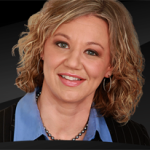 Lawrence: Yes, women are still the severe minority in sports radio. But there is no easy “fix” or formula to make the genre more balanced. The doors are definitely open for women who want to work in the business, but women have to be willing to put in the work and pay their dues, understanding both the business and the audience. It’s NOT the same as TV where the segments are much more controlled and physical appearance can go a long way. But knowledge, preparation, and dedication can lead to opportunities in this day and age of sports media.
Lawrence: Yes, women are still the severe minority in sports radio. But there is no easy “fix” or formula to make the genre more balanced. The doors are definitely open for women who want to work in the business, but women have to be willing to put in the work and pay their dues, understanding both the business and the audience. It’s NOT the same as TV where the segments are much more controlled and physical appearance can go a long way. But knowledge, preparation, and dedication can lead to opportunities in this day and age of sports media.
 Marks: Sports talk radio can be intimidating. As a host, you’re out there on an island, and with listeners calling in, you need to have every T crossed and i dotted, because you never know where the show may take you. It’s like a magic carpet ride and it can be overwhelming. Right now most women in the sports broadcasting arena are primarily hired as reporters and TV hosts. As society becomes more accepting of women having opinions on sports, I believe more will venture into sports radio.
Marks: Sports talk radio can be intimidating. As a host, you’re out there on an island, and with listeners calling in, you need to have every T crossed and i dotted, because you never know where the show may take you. It’s like a magic carpet ride and it can be overwhelming. Right now most women in the sports broadcasting arena are primarily hired as reporters and TV hosts. As society becomes more accepting of women having opinions on sports, I believe more will venture into sports radio.
 Taylor: I think that it’s a reflection of the fan base. Sports fans are still mostly male, so it makes sense that there would be mostly men speaking to them. Over the next 5-10 years as more women become vocal about their love for sports, and more women are accepted into the industry in more than the stereotypical roles, and the fan bases change their opinions of female personalities, this will change.
Taylor: I think that it’s a reflection of the fan base. Sports fans are still mostly male, so it makes sense that there would be mostly men speaking to them. Over the next 5-10 years as more women become vocal about their love for sports, and more women are accepted into the industry in more than the stereotypical roles, and the fan bases change their opinions of female personalities, this will change.
What advice would you give to a young woman who’s trying to make it in sports radio today but is having a difficult time breaking thru?
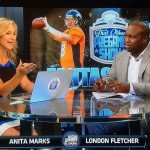 Marks: Hit the web! Dominate social media! Create your own podcast! Create your own YouTube channel! Intern at sports radio and TV stations – and go above and beyond what they ask of you. Build a following, be strong with your opinions, allow your personality to shine through, be persistent in sending samples of your work to stations, and don’t ever stop believing in yourself!
Marks: Hit the web! Dominate social media! Create your own podcast! Create your own YouTube channel! Intern at sports radio and TV stations – and go above and beyond what they ask of you. Build a following, be strong with your opinions, allow your personality to shine through, be persistent in sending samples of your work to stations, and don’t ever stop believing in yourself!
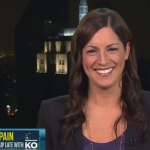 Spain: Find out what separates you from the pack and own it. For me, that’s always been my comedy background. For someone else it might be a great mind for statistics, a passion for baseball history, an interest in longform writing or breaking news coverage. Whatever it is, lead with it and show why you’re different than the many others who want a gig. Also, be as genuine as possible. People can see through you if you’re not yourself, and listeners and viewers above all else want authenticity. Also work very hard, be easy to work with and don’t have a thin skin.
Spain: Find out what separates you from the pack and own it. For me, that’s always been my comedy background. For someone else it might be a great mind for statistics, a passion for baseball history, an interest in longform writing or breaking news coverage. Whatever it is, lead with it and show why you’re different than the many others who want a gig. Also, be as genuine as possible. People can see through you if you’re not yourself, and listeners and viewers above all else want authenticity. Also work very hard, be easy to work with and don’t have a thin skin.
 Taylor: Be as active and as hard working as possible. Women in the industry start at a disadvantage, so they need to work harder, show up earlier, be more educated and more prepared. They aren’t given the benefit of the doubt and that’s something that will only make you better in the long run. Also, be willing to take the job that doesn’t pay well or may not be what you want to do long term. You have to work your way up and pay your dues in the media industry. There is no way around it, and it will only help you grow your talent. So many people get out of school and expect to walk right on to a set or get behind a microphone, and it doesn’t work that way. Don’t give up or get discouraged though, the hard work is worth it.
Taylor: Be as active and as hard working as possible. Women in the industry start at a disadvantage, so they need to work harder, show up earlier, be more educated and more prepared. They aren’t given the benefit of the doubt and that’s something that will only make you better in the long run. Also, be willing to take the job that doesn’t pay well or may not be what you want to do long term. You have to work your way up and pay your dues in the media industry. There is no way around it, and it will only help you grow your talent. So many people get out of school and expect to walk right on to a set or get behind a microphone, and it doesn’t work that way. Don’t give up or get discouraged though, the hard work is worth it.
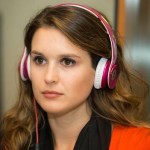 Smallmon: If you can, intern anywhere that will have you. This business is hard to break into for both genders, so get involved as early and often as you can. Find a mentor. Ask questions and learn from their experiences. The first thing I do every morning is read for an hour and a half. Be prepared, because if you aren’t, someone else will be. Speak up. Have a strong opinion and stick by it. Radio is very transparent, and listeners will identify a phony pretty quickly. You’re more than what you look like; so don’t let others reduce you to that. Social media can be your best friend and your worst enemy. Take what strangers say, both negative and positive, with a grain of salt. Have fun! Like any job, this one will come with its challenges, but at the end of the day, you’re being paid to talk about sports. Never forget that you’re one of the few lucky ones who get to do this for a living.
Smallmon: If you can, intern anywhere that will have you. This business is hard to break into for both genders, so get involved as early and often as you can. Find a mentor. Ask questions and learn from their experiences. The first thing I do every morning is read for an hour and a half. Be prepared, because if you aren’t, someone else will be. Speak up. Have a strong opinion and stick by it. Radio is very transparent, and listeners will identify a phony pretty quickly. You’re more than what you look like; so don’t let others reduce you to that. Social media can be your best friend and your worst enemy. Take what strangers say, both negative and positive, with a grain of salt. Have fun! Like any job, this one will come with its challenges, but at the end of the day, you’re being paid to talk about sports. Never forget that you’re one of the few lucky ones who get to do this for a living.
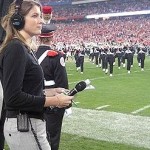 Gifford: Find something that differentiates your content from anything else that’s out there. If you’re female, that’s a little easier because there aren’t a ton of women in this format. So right there you’ve got something different. Then, the “rules” are the same – have an opinion, make me think, have some fun, and stay off social media! Reach out to people in the industry to provide feedback/thoughts on what you’re doing. And practice, practice, practice.
Gifford: Find something that differentiates your content from anything else that’s out there. If you’re female, that’s a little easier because there aren’t a ton of women in this format. So right there you’ve got something different. Then, the “rules” are the same – have an opinion, make me think, have some fun, and stay off social media! Reach out to people in the industry to provide feedback/thoughts on what you’re doing. And practice, practice, practice.

Jason Barrett is the Founder and CEO of Barrett Media. The company launched in September 2015 and has provided consulting services to America’s top audio and video brands, while simultaneously covering the media industry at BarrettMedia.com, becoming a daily destination for media professionals. Prior to Barrett Media, Jason built and programmed 95.7 The Game in San Francisco, and 101 ESPN in St. Louis. He was also the first sports programmer for SportsTalk 950 in Philadelphia, which later became 97.5 The Fanatic. Barrett also led 590 The Fan KFNS in St. Louis, and ESPN 1340/1390 in Poughkeepsie, NY, and worked on-air and behind the scenes at 101.5 WPDH, WTBQ 1110AM, and WPYX 106.5. He also spent two years at ESPN Radio in Bristol, CT producing ‘The Dan Patrick Show’ and ‘GameNight’. JB can be reached on Twitter @SportsRadioPD or by email at Jason@BarrettMedia.com.




